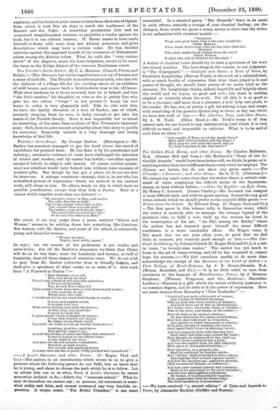POETEY. — Love - Songs. By George Barlow. (Remington.)—Mr. Barlow has somehow managed to
get his head above the crowd of candidates for poetical fame. He has done it by his persistence and industry; successive volumes of verse have challenged the attention of critics and readers, and by means less lawful,—rebellion against accepted beliefs in religion and morals. Of course, neither persist- ence nor rebellion would have helped him, without some measure of poetical gifts. But though he has got a place, we do not see that he improves. A strange weakness—strange, that is, in one who has undoubted powers of expression—which we noticed in his earliest work, still clings to him. He allows words to slip in which have no possible justification, except that they help a rhyme. Here is a stanza which supplies more than one instance :— " He ceased to believe in Man, and receive The gifts Man has to bold: The strong despair whose face is fair, Yea, sweeter than wrought gold ; The endless scope of desperate hope ; The proud Church waved her fan— So he ceased to believe in Man 1"
His creed, if we may judge from a poem entitled "Christ and Woman," seems to be settling down into something like Comtism. But woman, with Mr. Barlow, and poets of his school, is necessarily young and beautiful woman.
"Woman we sleet, Tender, snow-white, queen,"
he says ; but the woman of the proletariat is not tender and snow-white. For all Mr. Barlow's eloquence, we think that Christ will do, as he has done, more for humanity and woman, as half of humanity, than all these singers of sensuous verse. We do not wish to part from Mr. Barlow otherwise than in friendly fason, and shall give a specimen of what seems to us some of h. best work from "A Farewell to Poetry :"—
" Dear blossoms, roses red,
That once about my head
Waved with a flood of soft-caressing splendour,
I bid you all farewell ; Yea, to each flower that fell Upon youth's brows from heaven with flower-touch tender ;
A long good-bye to all—
White roses, lilies tall ; I would not fail to one sweet final thanks to render.
0 ferns and meadow-sweet, 0 rivulets that beat With silvery footing once amid the grasses,
A long, long, long good-bye!
0 many a sunset sky, 0 giant purple clouds in heaped-up masses, 0 seas that climbed and surged, By wintry storm-blasts urged,
Farewell—ere from you all my mortal vision passes!
Goodbye, good-bye, good-bye—
Blue perfect summer sky, And all the dreams of youth and hopes that wandered
Towards heaven on sun-bright wings :
A new chant in me rings, And gone are the old ecstasies I pondered ; Farewell, ye high designs, The wreath that manhood twines
Is better than the leaves youth wildly plucked and squandered."
—A Love's Garment, and other Poems. (C. Began Paul and Co.) —The author, in an introduction which seems to us to give a promise which the following poems do not fulfil, lets us know that he is young, and about to.choose the path which he is to follow. Let us advise him not to do what, from A Love's Garment, he seems somewhat inclined to do,—follow the "sensuous school." What he may do hereafter, we cannot say ; at present, his sentiment is some- what sickly and false, and cannot command any very forcible ex- pression. A tragic scene, "The Bridal Chamber," is not more
successful. In a classical piece, "The Masnads," there is, as usual in such efforts, scarcely a vestige of true classical feeling; yet the dialogue, from which we quote a scrap, seems to show that the writer is not unfamiliar with classical models :—
" ORPHEUS.
When suns grow faint, time is the year should die.
CHIEF MAINAD.
When death draws near, suns are less faint than fair.
ORPHEUS.
Who shall snatch hived wisdom from the wise ?
CHIEF MIEN.I.D.
Foolish who sigh to slumber ere the night."
A writer of classical verse should try to turn a specimen of his work into Greek iambics. The best thing in the volume, to our judgment, is "The Coastguard."—Gaslight and Stars : a Book of Verse, by Frederick Langbridge (Marcus Ward), is the work of a cultured man, with so much faculty of expression that, were there joined to it real power of thought, we should have poetry of no mean kind as the outcome. Mr. Langbridge thinks, indeed, hopefully and brightly about the world and its hopes, its good and evil ; but there is nothing original or masterly about his work. For all this, it is so good as to be a pleasure, and more than a pleasure, a real help and profit, to the reader. He has, too, as pretty a gift for writing songs, real songs, with something of the genuine lyrical ring in them, as any one whom we have met with of late.—The Circling Year, and other Poems. By A. B. Todd. (Elliot Stock.)—Mr. Todd's verse is of that correct and, we are bound to say, uninteresting kind which it is very difficult to read, and impossible to criticise. What is to be said of such lines as these ?— " Can nought, 0 Time, resist thy steady force ? Must dark oblivion follow still thy course ? Must man for ever leave the earth, and go To sleep forgotten in the dust below ?-


































 Previous page
Previous page